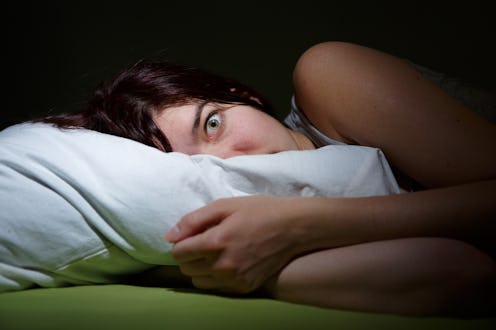If you've ever experienced a scary experience in the middle of the night that felt more paranormal than not, there might actually be a scientific explanation: According to new research, nighttime paranormal experiences could be explained by one of two sleep disorders: Exploding head syndrome, or sleep paralysis. Though they both have frightening names, they're actually fairly common sleep disorders.
According to research published in the journal Sleep Medicine Review, exploding head syndrome is "characterized by the perception of abrupt, loud noises when going to sleep or waking up." While exploding head syndrome involves hearing unexplained noises, the other sleep disorder — sleep paralysis — can also induce feelings of being haunted. The difference is that people who suffer from sleep paralysis wake up unable to move or speak and often sense a presence in the room.
"Over the centuries, symptoms of sleep paralysis have been described in many ways and often attributed to an 'evil' presence: unseen night demons in ancient times, the old hag in Shakespeare's Romeo and Juliet, and alien abductors," WebMD reported. "Almost every culture throughout history has had stories of shadowy evil creatures that terrify helpless humans at night."
Perhaps this is why most creepy things that happen in horror movies seem to take place at night. If you suffer from both sleep paralysis and exploding head syndrome, it's not hard to understand why going to bed might induce feelings of fear. Especially because no matter where you go, the "ghosts" seem to come with you.
If you don't have a sleep disorder, imagine going to bed and suddenly waking up to a terrifying crash. Perhaps you grab your baseball bat and skulk around the house looking for an intruder, as one does in the horror movie after hearing a strange sound. After deeming the situation safe, you go back to sleep only to wake up a few hours later feeling a ghostly presence next to your bed, but you're unable to move or scream for help.
While it's easy to attribute this awful phenomena to poltergeists, WebMD explained that sleep paralysis occurs when your body is between stages of wakefulness and sleep and feeling a presence in your room actually means you're still dreaming.
However, the cause of exploding head syndrome is still not entirely clear. WebMD noted that it could be caused by everything from minor seizures in the temporal lobe of the brain to sudden shifts in the parts of the middle ear to stress and anxiety.
This certainly makes it seem that the paranormal activity can't be ruled out entirely. And, what's more stressful than waking up to unexplained sounds? This obviously causes more stress and anxiety, which can cause more exploding head episodes. While these conditions are troubling for obvious reasons, the knowledge that you're not actually being haunted could bring some degree of relief.
"The more fear you feel during the episode, the more likely you are to stay anxious about it during the day," Temma Ehrenfeld reported for Psychology Today. "Your ideas about what causes sleep paralysis will also affect how much it bothers you, at least one study found. But accepting that you’re experiencing a common, harmless glitch can put your mind at rest."
Basically, the idea is that if you accept the scary event as sleep paralysis, it's less likely to cause you distress and you're less likely to feel like something other worldly is happening. On the other hand, if the episodes induce feeling of fear, they're more likely to cause stress.
"Feelings of threat and assault — such as sensing a presence in the room, feeling pressure on the chest, having difficulty breathing, or having a feeling of imminent death — were all associated with distress following sleep paralysis episodes," the Association for Psychological Science explained on its website.
"People who held supernatural beliefs about sleep paralysis experiences also experienced greater post-episode distress. Those who had more analytic cognitive styles, on the other hand, experienced comparatively less distress after sleep paralysis episodes."
If this research is correct, telling yourself that it's just sleep paralysis and you're not actually being haunted can make these episodes a lot less terrifying. So, if you suspect you may suffer from one of the sleep disorders, you should talk to your doctor before you call the ghostbusters crew.
